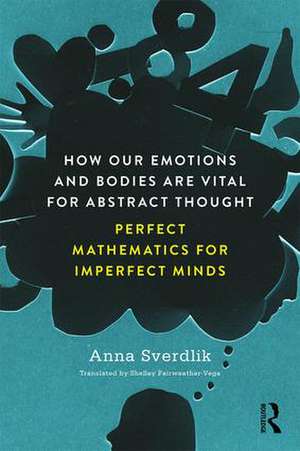How Our Emotions and Bodies are Vital for Abstract Thought: Perfect Mathematics for Imperfect Minds
Autor Anna Sverdliken Limba Engleză Paperback – 13 iun 2018
These questions are among the greatest enigmas of science and epistemology, discussed at length by mathematicians, physicians, and philosophers. But, curiously enough, neuroscientists have been absent in the debate, even though it is precisely the field of neuroscience—which studies the brain’s mechanisms for thinking and reasoning—that ought to be at the very center of these discussions.
How our Emotions and Bodies are Vital for Abstract Thought explores the unique mechanisms of cooperation between the body, emotions, and the cortex, based on fundamental physical principles. It is these mechanisms that help us to overcome the limitations of our physiology and allow our imperfect, human brains to make transcendent mathematical discoveries.
This book is written for anyone who is interested in the nature of abstract thought, including mathematicians, physicists, computer scientists, psychologists, and psychiatrists.
| Toate formatele și edițiile | Preț | Express |
|---|---|---|
| Paperback (1) | 384.86 lei 6-8 săpt. | |
| Taylor & Francis – 13 iun 2018 | 384.86 lei 6-8 săpt. | |
| Hardback (1) | 1000.27 lei 6-8 săpt. | |
| Taylor & Francis – 15 iun 2018 | 1000.27 lei 6-8 săpt. |
Preț: 384.86 lei
Nou
Puncte Express: 577
Preț estimativ în valută:
73.65€ • 76.61$ • 60.80£
73.65€ • 76.61$ • 60.80£
Carte tipărită la comandă
Livrare economică 14-28 aprilie
Preluare comenzi: 021 569.72.76
Specificații
ISBN-13: 9781138565869
ISBN-10: 1138565865
Pagini: 236
Ilustrații: 1 Tables, black and white; 6 Line drawings, black and white; 9 Halftones, black and white
Dimensiuni: 156 x 234 x 13 mm
Greutate: 0.34 kg
Ediția:1
Editura: Taylor & Francis
Colecția Routledge
Locul publicării:Oxford, United Kingdom
ISBN-10: 1138565865
Pagini: 236
Ilustrații: 1 Tables, black and white; 6 Line drawings, black and white; 9 Halftones, black and white
Dimensiuni: 156 x 234 x 13 mm
Greutate: 0.34 kg
Ediția:1
Editura: Taylor & Francis
Colecția Routledge
Locul publicării:Oxford, United Kingdom
Public țintă
PostgraduateCuprins
Table of Contents
List of Figures
Preface
Chapter 1. The unreasonable effectiveness of mathematics
Chapter 2. Why logic is never ideal
Chapter 3. Working memory and logical limitations
Chapter 4. Overpowered by emotion
Chapter 5. From cognition to recognition and back again
Chapter 6. Non-algorithmic thinking machine?
Chapter 7. How mathematics can outwit physiology
Afterword
Index
List of Figures
Preface
Chapter 1. The unreasonable effectiveness of mathematics
Chapter 2. Why logic is never ideal
Chapter 3. Working memory and logical limitations
Chapter 4. Overpowered by emotion
Chapter 5. From cognition to recognition and back again
Chapter 6. Non-algorithmic thinking machine?
Chapter 7. How mathematics can outwit physiology
Afterword
Index
Notă biografică
Anna Sverdlik is a clinical psychiatrist at Tel Hashomer, a major Israeli hospital. She specializes in brain injury and neurocognitive disorders.
Recenzii
This is a remarkable book, taking on the under-investigated overlap between two
very disparate worlds: on the one hand mathematics and rationality, contrasted with
emotions and embodiment. Based on the discoveries of modern affective neuroscience,
the book makes an impressive attempt at bridging the important conceptual divide
between feelings and formal thinking, a divide almost as troubling as that between
mind and brain itself. It made me think about some old ideas in quite new ways.’
Professor Oliver Turnbull, Bangor University, UK
‘Anna Sverdlik takes the reader on a fascinating journey to discover the nature of
abstract thinking from a neuroscience perspective. Using mathematics as an example,
she illustrates how our thinking is deeply rooted in a non-algorithmic component that
relies on our visceral system. The beauty and elegance of mathematics precisely lies
in the fact that it unites logical thinking supported by our neocortex with intuitions
supported by our emotions and body that have evolved to solve problems over
thousands of years.’
Dr. Melissa Libertus, University of Pittsburgh, USA
very disparate worlds: on the one hand mathematics and rationality, contrasted with
emotions and embodiment. Based on the discoveries of modern affective neuroscience,
the book makes an impressive attempt at bridging the important conceptual divide
between feelings and formal thinking, a divide almost as troubling as that between
mind and brain itself. It made me think about some old ideas in quite new ways.’
Professor Oliver Turnbull, Bangor University, UK
‘Anna Sverdlik takes the reader on a fascinating journey to discover the nature of
abstract thinking from a neuroscience perspective. Using mathematics as an example,
she illustrates how our thinking is deeply rooted in a non-algorithmic component that
relies on our visceral system. The beauty and elegance of mathematics precisely lies
in the fact that it unites logical thinking supported by our neocortex with intuitions
supported by our emotions and body that have evolved to solve problems over
thousands of years.’
Dr. Melissa Libertus, University of Pittsburgh, USA
Descriere
The book describes the mechanisms that make formal logic possible, before discussing errors that occur in our cortical constructs, and the implications this has for abstract thought. The book then goes on to explore the roles of emotion and embodiment, and the unique relationship they have in minimising the shortcomings of our physiology to provide us with an understanding of mathematics.
